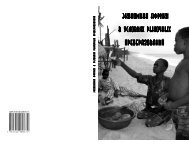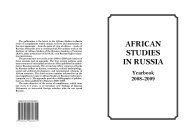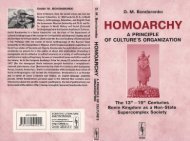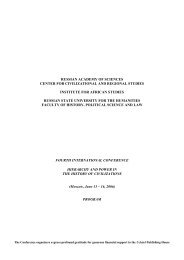L. Fituni, I. Abramova Resource Potential of Africa and Russia's ...
L. Fituni, I. Abramova Resource Potential of Africa and Russia's ...
L. Fituni, I. Abramova Resource Potential of Africa and Russia's ...
Create successful ePaper yourself
Turn your PDF publications into a flip-book with our unique Google optimized e-Paper software.
significant part <strong>of</strong> biotic resources (i.e. obtained from biosphere, like<br />
forest <strong>and</strong> other flora resources, animals, fish <strong>and</strong> other marine bioresources)<br />
will thus remain beyond the scope <strong>of</strong> our analysis. In fact,<br />
we exclude a huge proportion <strong>of</strong> abiotic resources as well (l<strong>and</strong>/soil,<br />
water, air, etc).<br />
In fact, except for occasional exclusions, the study deals with<br />
geological resources <strong>of</strong> Russia <strong>and</strong> <strong>Africa</strong>. In this respect, we recognize<br />
our limitations, <strong>and</strong> that our research is incomplete. However,<br />
the authors do not doubt that even the current limited scope <strong>of</strong><br />
analysis provides a reasonably true picture <strong>of</strong> practical opportunities<br />
open for Russia <strong>and</strong> <strong>Africa</strong>.<br />
Natural resources potential <strong>of</strong> Russia is over 20% <strong>of</strong> the world’s<br />
reserves. This fact places Russia in a special position among industrialized<br />
countries. Natural resources used by the economy <strong>of</strong> Russia<br />
account for 95.7% <strong>of</strong> the national wealth. There are large deposits <strong>of</strong><br />
fuel <strong>and</strong> energy resources: oil, natural gas, coal <strong>and</strong> uranium ore.<br />
Russia is ranked first in the world by gas reserves (32% <strong>of</strong> world’s<br />
reserves, 30% <strong>of</strong> world production), the second in oil production<br />
(10% share <strong>of</strong> world production), the third – in coal reserves (22<br />
coal basins, 115 fields, including those in European Russia – about<br />
15.6% in Siberia – 66.8% in the Far East – 12.9%, in the Urals –<br />
4.3%). In terms <strong>of</strong> reserves <strong>of</strong> iron ores Russia occupies the first<br />
place, in tin – the second, lead – the third. Russia also occupies a<br />
leading position in the world in wood provision. In 2010, according<br />
to assessments <strong>of</strong> American intelligence sources, Russia was the<br />
richest country in gold reserves.<br />
In Russia, there are five major oil <strong>and</strong> gas provinces located in<br />
European part <strong>of</strong> the country <strong>and</strong> in Western Siberia in 10 regions<br />
<strong>and</strong> 11 provinces <strong>and</strong> republics: West Siberian, Volga-Urals, Timan-<br />
Pechora, the North Caucasus <strong>and</strong> the Caspian Sea area.<br />
In addition, iron, nickel, copper, aluminum, tin, polymetals,<br />
chromium, tungsten, gold, <strong>and</strong> silver ores are mined. There is a great<br />
variety <strong>of</strong> non-metallic ores: phosphates, apatites, talc, asbestos,<br />
mica, potash <strong>and</strong> salt, diamonds, amber, precious <strong>and</strong> semiprecious<br />
stones. Very common are construction materials: s<strong>and</strong>, clay, limestone,<br />
marble, granite <strong>and</strong> other materials.<br />
64







